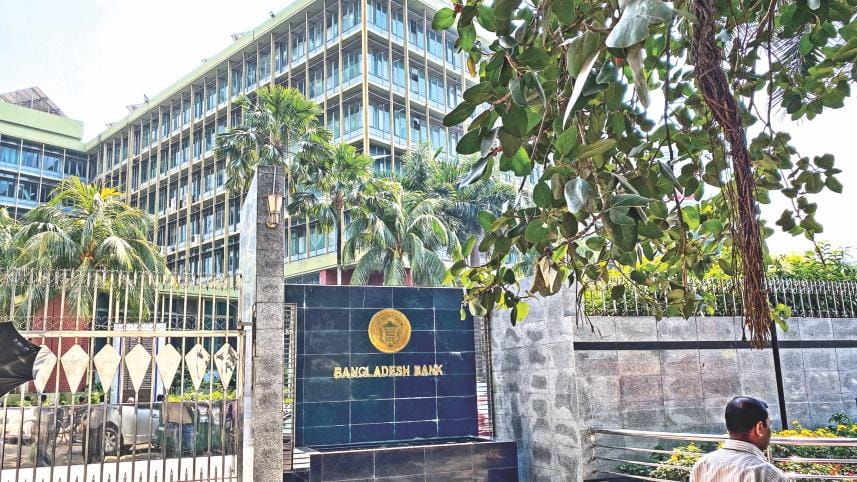Banking Sector: Risky loans stand at Tk 377,922cr

The banking sector's total risky loans amounted to Tk 377,922 crore at the end of last year, in a development that makes for a sobering reading of the actual health of this vital sector of the economy.
The amount was arrived at by calculating the total non-performing loans (NPL), outstanding rescheduled loans and outstanding restructured written-off loans, all of which were disclosed in the latest edition of the Bangladesh Bank's Financial Stability Report, which was published yesterday.
At the end of 2022, the banking sector's NPL stood at Tk 120,649 crore, outstanding rescheduled loans Tk 212,780 crore and outstanding written-off loans Tk 44,493 crore.
"[The distressed asset figure] is almost half of the national budget for this fiscal year -- it shows the banking sector is heading towards an untenable situation," said Ahsan H Mansur, executive director of the Policy Research Institute of Bangladesh.
The breakdown of distressed assets comes as part of the conditions agreed with the International Monetary Fund for the $4.7 billion loan.
The central bank used to report the sector's distressed assets in its annual financial stability report that comes out every June, and the IMF has stipulated that the practice is restarted.
"The COVID-19 financial support policies are set to expire in December 2022. As the unwinding of these policies may lead to a gradual realisation in the losses in the banking system, asset classifications, in particular restructured loans, should accurately reflect current balance sheet risks and distressed assets be adequately provisioned," said the IMF staff report in January.
Besides, as per international best practices, distressed assets are reported alongside NPLs to reflect the true state of the banking sector's stressed assets.
"Asset quality of the banking sector as a whole slightly deteriorated in 2022 as gross NPL showed a marginal rise," the BB said in the Financial Stability Report.
At the end of 2022, NPLs accounted for 8.16 percent of total outstanding loans, in contrast to 7.93 percent a year earlier.
Of the NPLs, the ship building and shipbreaking industry accounted for 22.43 percent of NPLs, which is the highest.
Leather and leather-based industries had the next highest NPLs (11.75 percent), followed by textile (11.54 percent) and garment (11.12 percent).
Ensuring the proper monitoring of regular and rescheduled/restructured loans and the pace of recovery of NPLs may improve the asset quality of the banking industry, the BB report said.
"Nonetheless, external issues like prolongation of the Russia-Ukraine conflict and other geopolitical issues may result in slow business as well as impaired debt-servicing capacity of the borrowers, which might ultimately deteriorate the asset quality of the overall banking sector in Bangladesh.
Meanwhile, almost double the amount of loans was rescheduled in 2022 than in 2021 as the loan moratorium facility introduced during the pandemic was weaned off.
In 2022, loans amounting to Tk 63,720 crore were rescheduled, up from Tk 26,810 crore the previous year.
"When compared with pre-COVID situation, rescheduled amount in the review year was not that much higher," the BB report said.
In 2019, the total amount of rescheduled loans stood at Tk 52,370 crore.
At the end of 2022, 80.8 percent of the rescheduled loans remained unclassified.
Ship building and shipbreaking industry accounted for 33.8 percent of the outstanding rescheduled loans, followed by the industrial sector (29.2 percent) and textile and garment (21.1 percent).
"There has been a general rise in classified outstanding rescheduled loan ratio across most of the sectors."
The highest ratio was observed in the ship building and ship breaking sector, followed by industrial, garment and textile, and the export credit sector.
"This is not a good sign -- it is a legacy of the past and didn't happen overnight," said Salehuddin Ahmed, a former BB governor.
He went on place the blame squarely on the policy.
"If the policy is not proper, if the implementation is not proper, the habitual defaulters will always get away. The underlying problem is deep."
He particularly singled out the practice of rescheduling loans more than once for the ballooning of the banking sector's stressed assets.
"It is encouraging signs to defaulters and a perverse incentive. It does not happen anywhere in the world. If you give concessions, you get cumulative problems. This has never solved matters. It is a perverse incentive," he added,
Mansur, a former chairman of Brac Bank, said the chances of not getting back the rescheduled loans are high.
"There is no easy way out of this situation -- it will be a painful process. How will the government capitalise such a sum? The government's debt will go up by 7-8 percent."




 For all latest news, follow The Daily Star's Google News channel.
For all latest news, follow The Daily Star's Google News channel.
Comments